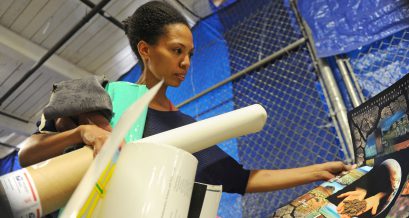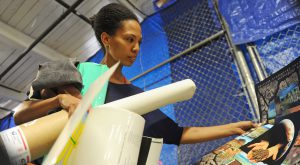As I walk into the Baltimore City Detention Center for my weekly garden class, a guard remarks on how big the plants are getting. I place my belongings into a bin and get patted down, and another employee tells me about her own garden. I tell her about the direction of the program, and for better serving the juveniles locked up there, facing adult charges. When they get out, I hope to be able to provide them with community service options or assist them in getting jobs in the field of horticulture. My hope for the city is that we can use gardening in schools, churches, and transition environments to heal and build stronger and healthier communities.
-
A humane education: teaching positive reinforcement in the classroom
Monday, July 23, 2012The Kids-4-K9s Humane Education Program offers students and teachers an opportunity to focus on positive changes, instead of failures. “I like the way we ignore Bella when she doesn’t get it right and wait to praise her when she does,” one third grade student shared as part of his journal entry for the session. It is this kind of reflection and sharing that promotes real learning and growth that can extend far beyond the classroom.
-
More than just a garden
Monday, July 16, 2012We live in a time when the social contract between individual and society has become implicit. We forget that as individuals we engage in our community, our government, and with our neighbors because they are there for our benefit as we are for theirs—to make our lives better than if we went on alone. For the members of low-income, underserved communities such as Brooklyn/Curtis Bay however, this contract has failed.
-
Guaranteeing appropriate medical care for all
Monday, July 09, 2012Since the health of each member in any community is a collective responsibility of the community as a whole, I’d like to propose an idea that should not be audacious at all: to be a responsible community, our country needs to join the rest of the developed world in establishing a health care system where routine access to appropriate medical care for every member is not only a possibility, but a certainty.



